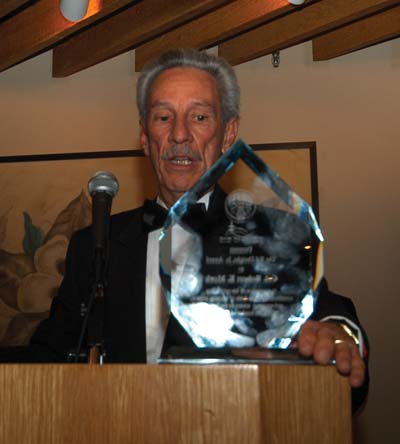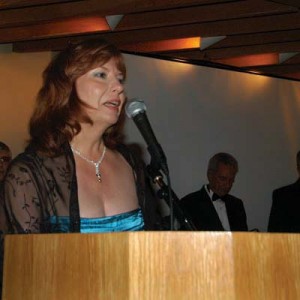By Deb Smith
Four leaders in the aviation and aerospace field were amply honored July 30 for their contributions to area youth at the second annual Shades of Blue Awards Dinner.
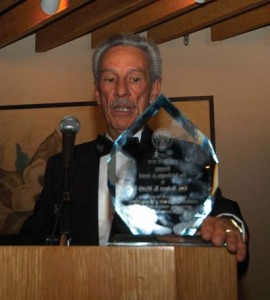
A humbled Robert Mock, professor of aviation and aerospace science at Metropolitan State College of Denver, accepts the Ed Dwight Jr. award.
Dr. Patty Arnold, vice president of education for the Space Foundation; Maj. James Harrison (ret.), Tuskegee Airmen; Col. Robert Mock (ret.), professor of aviation and aerospace science at Metropolitan State College of Denver; and Col. Fitzroy “Buck” Newsum (ret.), also a member of the famed Tuskegee Airmen, each received the prestigious Shades of Blue Ed Dwight Jr. award, recognizing selfless dedication to the furthering of air and space studies for the nation’s youth.
The award, named after America’s first black astronaut trainee, who is now a preeminent sculptor, is presented to those who embody the spirit and determination Dwight demonstrated as he struggled though bureaucratic attempts to thwart his place in American aerospace history. Dwight was on hand for the evening’s festivities and to assist in the presentation of the awards.
“During Ed’s time, he had the opportunity to be directed by the president, John F. Kennedy, to be the first African-American astronaut. Unfortunately, due to the era, the times would not allow him to continue in his career,” said Willie Daniels, founder and president of Shades of Blue. “However, with those things in mind, you overcome adversity, you overcome obstacles and you don’t let anything stop you. And you keep on going. If you don’t find a path one way, you find another.”
Echoing those thoughts was keynote speaker John Cruzat, vice president of the Colorado Springs Urban League, who extended a challenge to audience members to be mindful of the need for diversification in the industry.
“At the Urban League, we connect with Shades of Blue through the youth development piece of our program,” he said. “Youth development is by far the most important thing that we do. It’s good to know that organizations like Shades of Blue exist to provide students the opportunity to participate in an industry that apparently is in crisis, because there are indications that the aviation and aerospace industry is suffering in the workforce area.”
What Cruzat referred to is the nationwide trend to outsource high-level air and space positions to individuals other than Americans.
“It’s amazing to think that our propensity now is to outsource a lot of the high-level positions…and then couple that with the importation of human capital from other nations,” he added. “And where does that leave us? It leaves us in a situation where we have allowed a technological advantage to have been depleted…so the industry will always be struggling to regain its footing and especially as it relates to communities of color. We want and need a diverse aviation and aerospace community to keep this nation strong. We’re relying on our young people and organizations like Shades of Blue to provide those opportunities, because sometimes all our children need is a chance.”
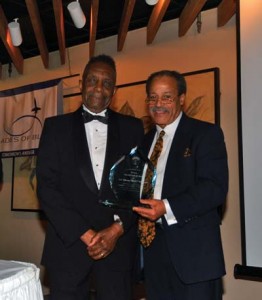
L to R: Tuskegee Airman Col. Fitzroy “Buck” Newsum (ret.) with Ed. Dwight Jr., who was on hand to congratulate award recipients.
Cruzat went on to say that unless support for organizations like Shades of Blue continues, “We will have a major challenge ahead filling the pipeline to ensure that children interested in aerospace have the skills and opportunity to participate, in a time when it should be all too easy for them to do just that.”
Joy Knight of Lockheed Martin, corporate sponsor spokeswoman, attested to Cruzat’s thought by reminding businesses of their stake in the education of youth. She backed up her statement with sobering numbers.
“We know from statistics posted by the U.S Department of Education that the number of students earning bachelors degrees in engineering peaked in the mid to late eighties and has been declining ever since,” said Knight. “We also know from results regarding the Third International Math and Science Tests that students in the U.S. don’t do as well in math and science as students in other countries, like Korea, Hungary and the Russian federation. And the Colorado Student Assessment Program scores indicate that only 50 percent of Colorado students are proficient in science.”
That’s not so encouraging when one realizes that Colorado ranks in the top five economies that have a large stake in aviation and aerospace advancement.
“More than 100,000 people are employed in segments of the (air and space) industry across the state,” Knight continued. “A preliminary report on the Colorado Space Strategy, issued by the governor’s office in the summer of 2000, forecast 10 percent growth for the commercial sector. Furthermore, jobs in the industry in the state are expected to increase from about 113,000 today to approximately 232,000 by 2010.”
Seems like a big hole to fill. But Daniels says Shades of Blue is ready to help.
“Basically, what we do is engage youth by going into their classrooms and talking to them,” he said. “Not to stand there and say, ‘I’m a pilot; be like me,’ but to engage them for five, 10 or 15 years.”
Daniels said that what makes Shades of Blue so different is that they track students from a very young age all the way trough high school and even college to ensure they have all the skills they need to pursue their career goals in aviation and aerospace.
“We take airline pilots, alongside of engineers, scientists, and professionals, from a variety of disciplines, and put them in the classrooms,” said Daniels. “We plant the seed at an early age and then track them all the way through college. Then, once they graduate, we help facilitate an avenue into employment.”
Through their individual works—and collectively though Shades of Blue—Arnold, Harrison, Mock and Newsum have each helped bring to fruition the aviation dreams of youth across the state.
“You are standing on the shoulders of giants,” said Daniels, to the young people in the audience, as he summed up the accomplishments of the evening’s award recipients.
“I’m really honored to receive this award,” said Arnold, who helped pave the way for a collaborative effort between the Space Foundation and the University of Colorado at Colorado Springs, to jointly offer a space-studies based graduate degree for teachers. “I have the privilege of working with teachers, students and organizations like Shades of Blue. Everyone tonight has addressed the absolute importance of having our students be prepared for the workforce and probably more important, for national security. The fact that I have the opportunity to mold future generations is something that I feel very fortunate to have.”
Tuskegee Airman James Harrison received his commission in 1945 and graduated from undergraduate pilot training at the Tuskegee Institute in Alabama.
“I consider this prestigious award something worthy to receive, and I think the youth of today—the leaders of tomorrow—are going to look at something like this, and maybe be inspired to do it also,” said Harrison.
A very humbled Robert Mock told the audience he felt “…like a prince amongst kings and queens.”
Mock, who served in the Air Force as both a fighter pilot and weather forecaster, retired with honors that include both the Bronze Star and the Purple Heart. He has been active in education at Metropolitan State College since 1987.
“Knowledge is power, and no one can ever steal that from you,” the soft-spoken Mock told students in the audience. “To be associated with a name like Ed Dwight also is just absolutely overwhelming for me. I’m just a plain old fighter pilot trying to do my job—what ever that is. But what I would share with you tonight is that we mustn’t leave here and just say this has been a wonderful evening… I don’t care what color or what shape you are, where you came from, or where you think you’re going, but if you have a dream about aerospace, it’s incumbent upon all of us in this room tonight to nurture that dream.”
The final recipient was Col. Fitzroy “Buck” Newsum (ret.), who also was a member of the legendary Tuskegee Airmen.
“While I was in this room tonight, my mind went back to when I was 10 years old,” he said. “That was when I saw my first airplane. I didn’t even know what it was. I wasn’t in this country, and I was constantly watching the pilot take off every evening and fly around.”
Newsum explained that his mother, angered by his wiling away the hours gazing at the craft, asked him why he continued to watch the plane.
“Well,” said Newsum. “I think that’s what I want to do.”
Newsum chuckled at the fact that after he returned from World War II, she proudly said, “This is my son, the captain.”
Newsum cautioned the youth of today to always be prepared.
“You always have to be ahead of the game,” he said. “You never know when opportunity is going to knock on your door.”
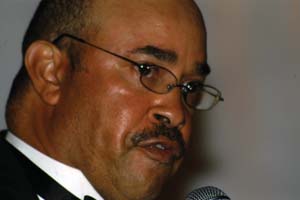
Willie Daniels, Shades of Blue founder and president, encourages young people interested in careers in the aviation and aerospace field to be ready for the challenge.
Shades of Blue is a corporation organized exclusively for educational and charitable purposes pursuant to sections 501 (c)(3) of the Internal Revenue Code of 1986. The mission of the organization is to provide young people with the educational opportunities, training and employment assistance needed to pursue careers in the aviation and aerospace industries, and to assist educators with the development of curricula that will prepare students for careers in those industries.
Shades of Blue was founded by a group of airline pilots, educators and business people who have an interest in aviation and aerospace and who hope to introduce students to career opportunities available in the field of flight.
For more information, visit
[http://www.ourshadesofblue.org].
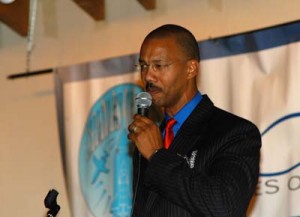
Keynote speaker John Cruzat of the Colorado Springs Urban League challenges audience members to encourage diversity in the aerospace industry.











